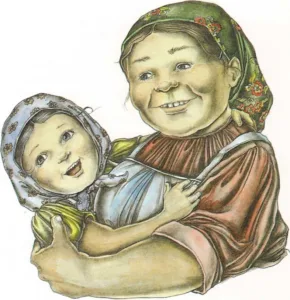My Mother Is the Most Beautiful Woman in the World
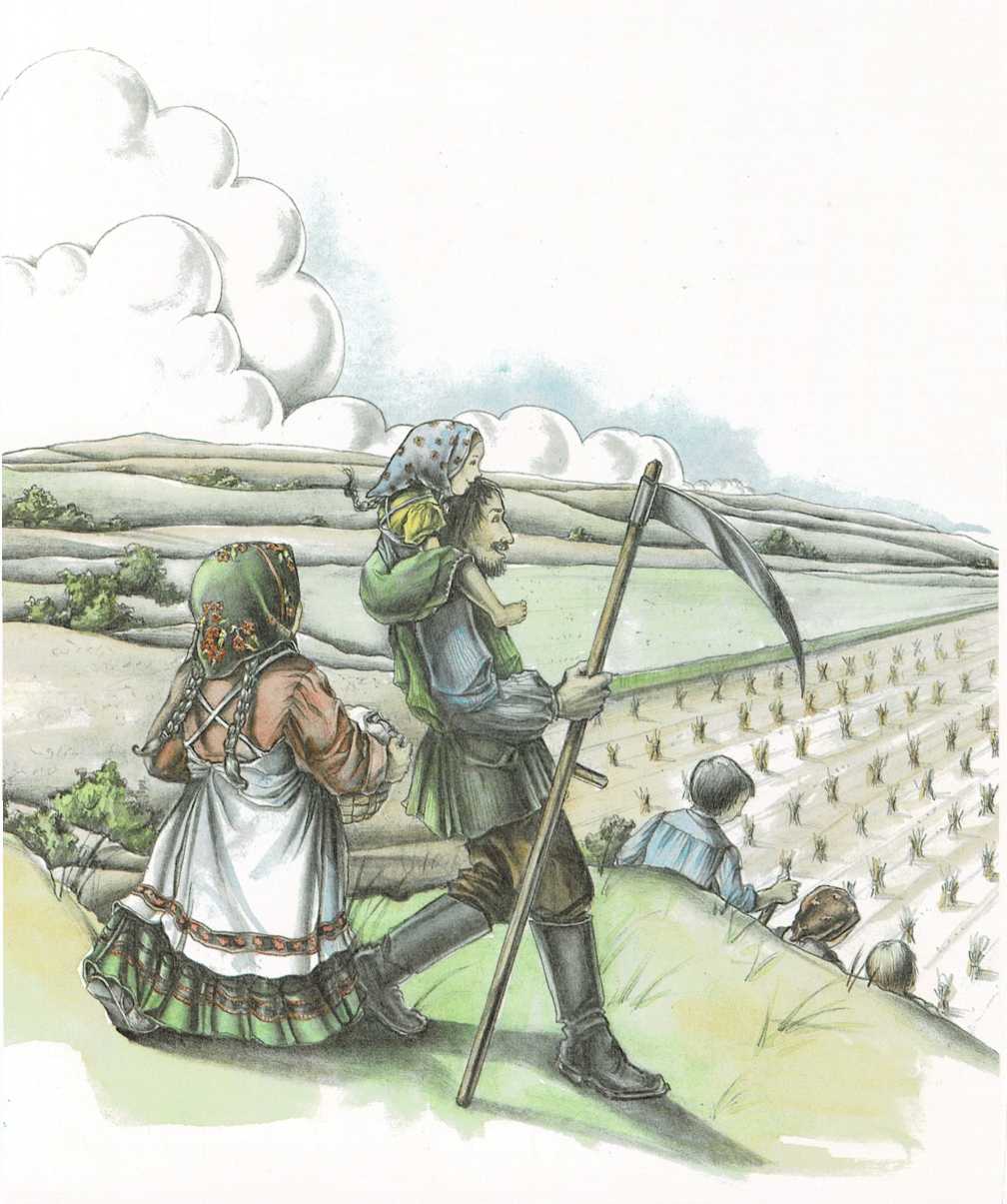
A Russian folk tale retold by Becky Reyher
Once upon a time, long, long ago, when the harvest season had come
again in the Ukraine, the villagers were all busy cutting and
gathering the wheat. For this is the land from which most Russians get
the flour for their bread.
Marfa and Ivan went to the field early each day, as did all their
children. There they stayed until sundown. Varya was Marfa’s and Ivan’s
youngest little girl, six years old. When everyone went to the fields in
harvest time, Varya went, too. Her legs were so short she had to run and
skip to keep up with her mother’s and father’s long steps.
\”Varyachka, you are a little slowpoke!” her father said to her. Then,
laughing loudly, he swung her up on his shoulder where she had to hold
tight to his neck, for his arms were full carrying the day’s lunch and
the long scythe to cut the wheat.
In the field, in the long even rows between the thick wheat, Varya knew
just what she must do. First, she must stay at least twenty or thirty
paces behind her father, who now took even greater and bigger steps, so
that he might have plenty of room to swing wide the newly sharpened
scythe.
\”Stand back, Varyachka! Mind the scythe!” he warned. Swish, swish,
swish, went his even strokes, and down came the wheat, faster and
faster, as he made his great strides.
Soon Marfa began to follow Ivan. She gathered the wheat in sheaves or
bunches just big enough to bind together with a strand of braided wheat.
Varya, eager to be useful, helped gather the wheat, and held each bunch
while her mother tied it. When three sheaves were tied, they were
stacked against each other in a little pyramid.
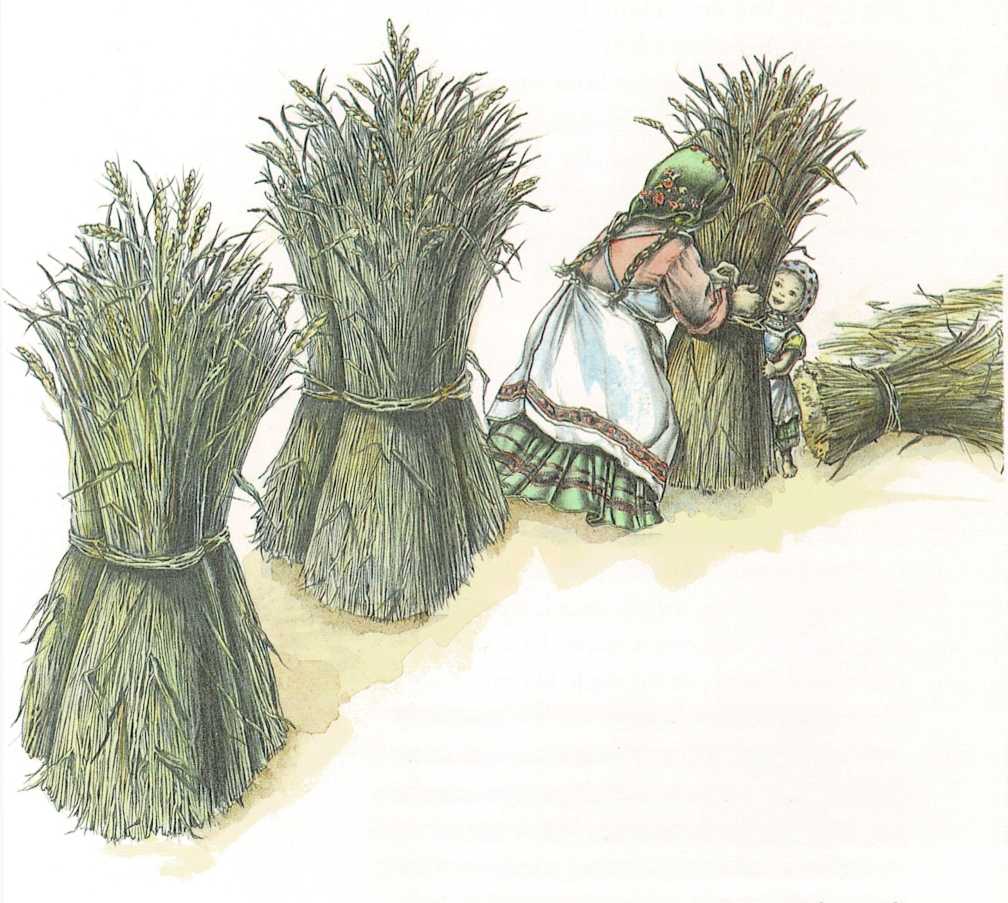
\”Careful, Varyachka!” her mother cautioned. \”The wheat side up!”
After a while, instead of long rows of wheat, there were long rows of
sheaves, standing stiffly.
Sometimes Varya forgot to follow her mother. On very hot days she
stopped to rest upon the warm ground, and let her tired, bare feet and
toes tickle the dark, moist earth. A while later she ran and caught up
with her mother, and then her mother hugged her to her and wiped her
dripping face. Even though her mother’s arms and bosom were hot and
damp, they felt cool and restful to Varya.
Day after day, Ivan, Marfa, and Varya went to the field to cut and stack
the wheat. Then a big wagon came and everyone pitched the wheat up to
the driver, who packed it in solidly and carefully and took it to the
threshing barn.
The villagers worked tirelessly. Their muscles ached, but there was a
song in their hearts, and there were merry chuckles on their lips. Hard
work produced a rich harvest. There would be wheat for everybody.
Finally, it was the last day of the harvest. By evening, all the wheat
would be cut, stacked in pyramids, and waiting for the wagon to take it
to the threshing barn.
Bright and early, Marfa, Ivan, and Varya went to the wheat field. \”We
must get to it,” warned Ivan. \”This is our last day to get the wheat
in!”
\”It has been a good crop, Ivan, hasn’t it?” asked Marfa.
\”Indeed, yes!” Ivan answered heartily. \”And it will mean plenty to eat
for the winter. We have much to be thankful for.”
Marfa and Ivan worked quicker and harder than ever. They did not seem to
notice the hot sun. The wheat swished almost savagely as it came rushing
down.
But to Varya the day seemed the longest she had ever lived. The sun
seemed hotter than on any other day, and her feet seemed almost too
heavy to lift.
Varya peered into the next row of wheat that was not yet cut. There it
was cool and pleasant and the sun did not bear down with its almost
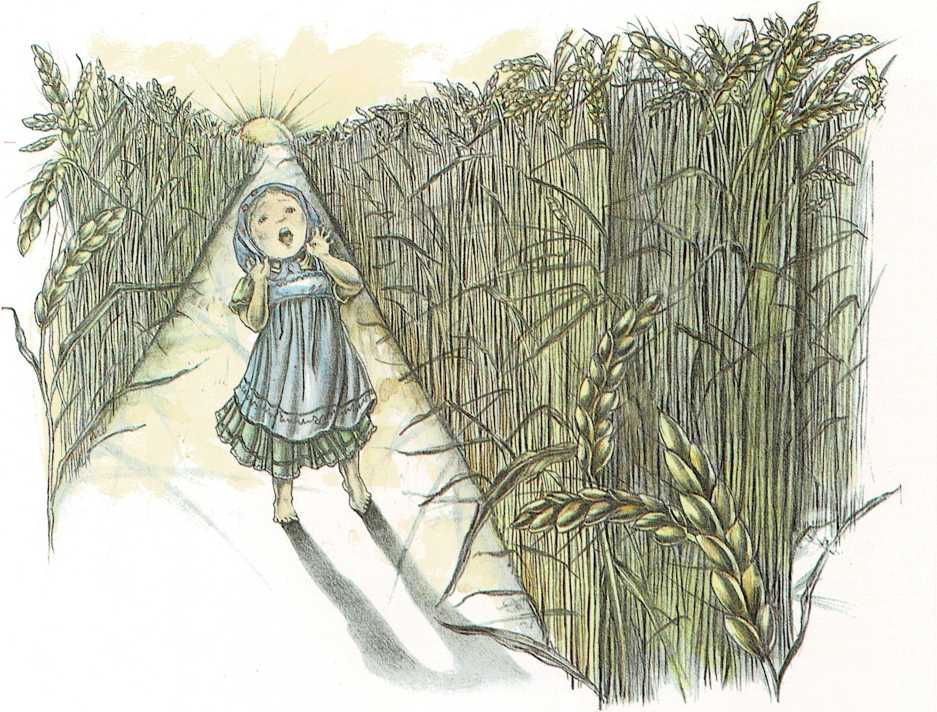
unbearable heat. Varya moved in just a little farther to surround
herself with that blessed coolness. \”How lucky I am!” she thought, \”to
be able to hide away from the hot sun. I will do this for just a few
minutes. Surely, Mamochka will not mind if I do not help her all the
day.”
Soon Varya grew sleepy, for in so cool a place one could curl up and be
very quiet and comfortable.
When Varya woke, she jumped to her feet and started to run toward her
mother. But her mother was nowhere in sight.
Varya called, \”Mama! Mama! Mamochka!” But there was no answer.
Sometimes her mother got ahead of her and was so busy with her work she
did not hear. \”Maybe if I run along the row, I will catch up with her,”
Varya thought. She ran and ran, and soon she was out of breath, but
nowhere could she see her mother.
\”Maybe I have gone in the wrong direction,” she said to herself. So she
ran the other way. But here, too, there was no trace of her mother.
Varya was alone in the wheat fields. She could see nothing but tall
pyramids of wheat towering above her. When she called out, her voice
brought no response, no help. Overhead, the sun was not so bright as it
had been. Varya knew that soon it would be night and that she must find
her mother.
Varya pushed through the last of the wheat that had not yet been cut,
breaking her own pathway, which bent and hurt the wheat. She would not
have done this had she not been frightened.
It was almost dark when Varya stumbled into a clearing where several men
and women had paused to gossip after the day’s work. It took her only a
second to see that these were strangers, and that neither her mother nor
father were among them.
The little girl stared ahead of her, not knowing what to do. One of the
men spied her and said in a booming voice he thought was friendly,
\”Look what we have here!”
Everyone turned to Varya. She was sorry that with so many strangers
looking at her she had her hair caught back in a tiny braid with
a bit of string, and that she was wearing her oldest, most faded dress.
Surely, too, by now her face must be as streaked with dirt as were her
legs and dress. This made her burst into tears.
\”Poor little thing,” cried one of the women, putting her arms around
Varya. \”She is lost!” But this sympathy, and the strange voices, made
Varya want her mother all the more. She could not help crying.
\”We must know her name, and the name of her mother and father. Then we
can unite them,” said the women.
\”Little girl, little girl,” they said, \”what is your name? What is
your mother and father’s name?” But Varya was too unhappy to speak.
Finally, because her longing for her mother was so great, she sobbed
out:
\”My mother is the most beautiful woman in the world!”
All the men and women smiled. The tallest man, Kolya, clapped his hands
and laughingly said, \”Now we have something to go on. Bring Katya,
Manya, Vyera, Nadya,” the tall man, Kolya, called to one boy. \”And
don’t forget the beauty, Lisa,” he called to another boy.
The women came running. These were orders from Kolya, the village
leader. Also, the mothers who had left the fields early to get supper
for their families thought perhaps this was their child who was lost.
As each beautiful woman came rushing up, blushing and proud that she had
been so chosen, Kolya would say to her: \”We have a little lost
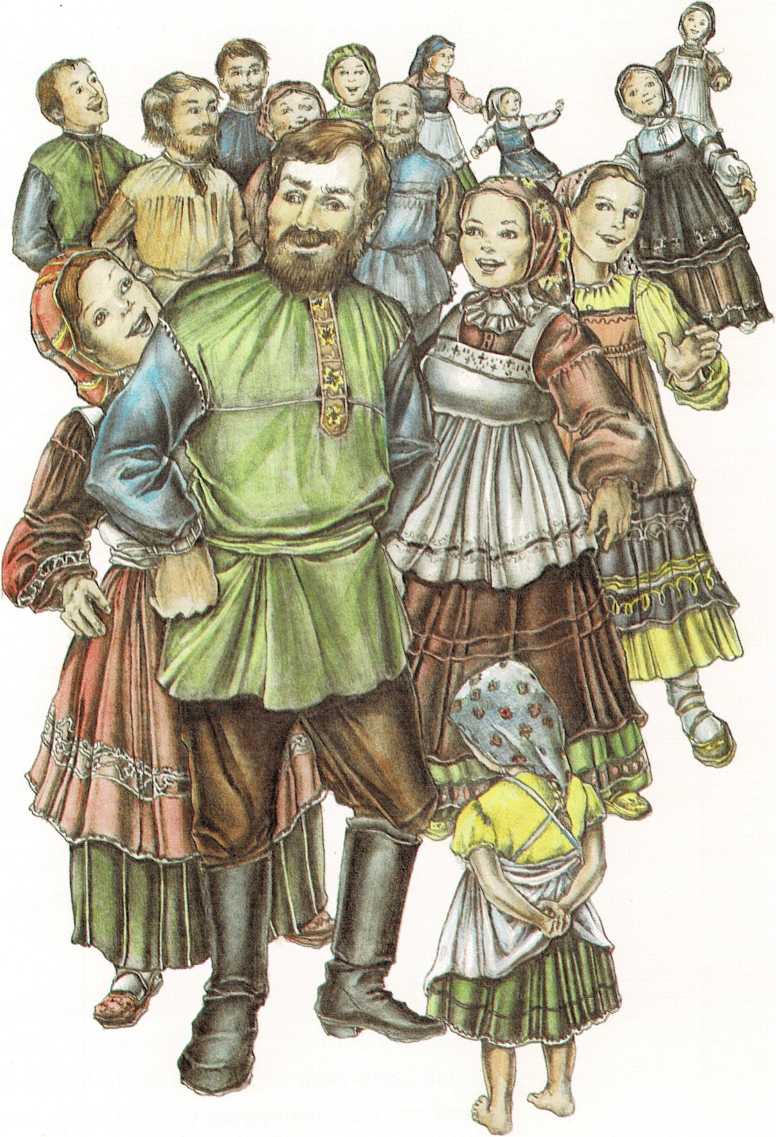
one here. Stand back, everyone, while the little one tells us if this is
her mother!”
The mothers laughed and pushed, and called to Kolya: \”You big tease!
What about asking each mother if this is her child? We know our
children!”
To Varya this was very serious, for she was lost and she was desperate
without her mother. As she looked at each strange woman, Varya shook her
head in disappointment and sobbed harder. Soon every known beauty from
far and near, from distances much farther than a child could have
strayed, had come and gone. Not one of them was Varya’s mother.
The villagers were really worried. They shook their heads. Kolya spoke
for them. \”One of us will have to take the little one home for the
night. Tomorrow may bring fresh wisdom to guide us.”
Just then a breathless, excited woman came puffing up to the crowd. Her
face was big and broad, and her body even larger. Her eyes were little
pale slits between a great lump of a nose. The mouth was almost
toothless. Even when she was a young girl everyone had said, \”A homely
girl like Marfa is lucky to get a good husband like Ivan.”
\”Varyachka!” cried this woman.
\”Mamochka!” cried the little girl, and they fell into each other’s
arms. The two of them beamed upon each other. The smile Varya had longed
for was once again shining upon her. Varya cuddled into that ample and
familiar bosom.
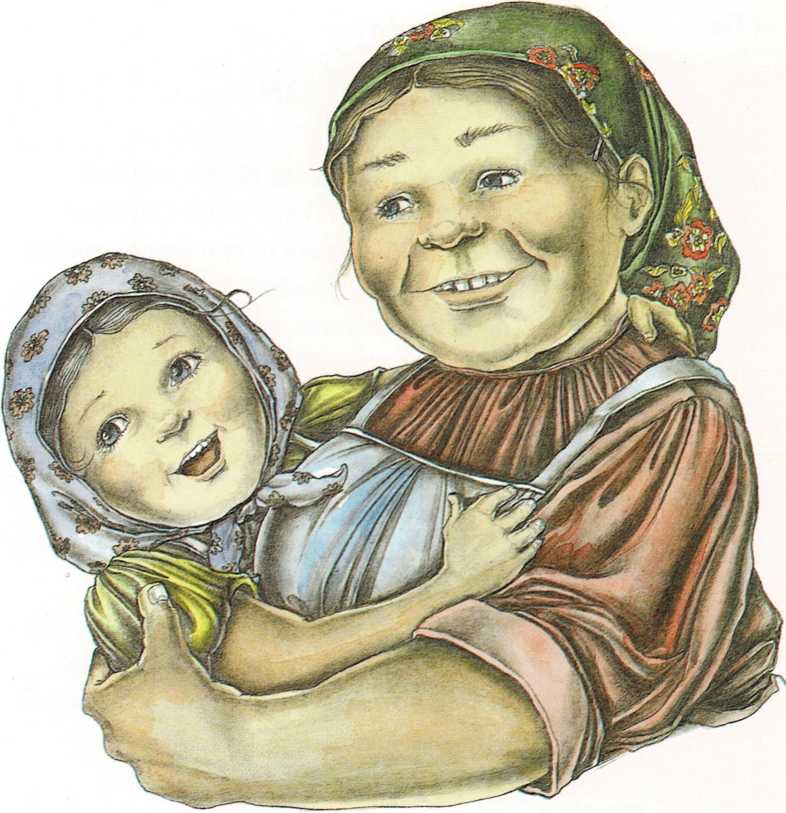
All of the villagers smiled thankfully when Varya looked up from her
mother’s shoulder and said with joy:
\”This is my mother! I told you my mother is the most beautiful woman in
the world!”
The group of friends and neighbors, too, beamed upon each other. Kolya
repeated the proverb so well known to all of them, a proverb which
little Varya had just proved: \”We do not love people because they are
beautiful, but they seem beautiful to us because we love them.”

